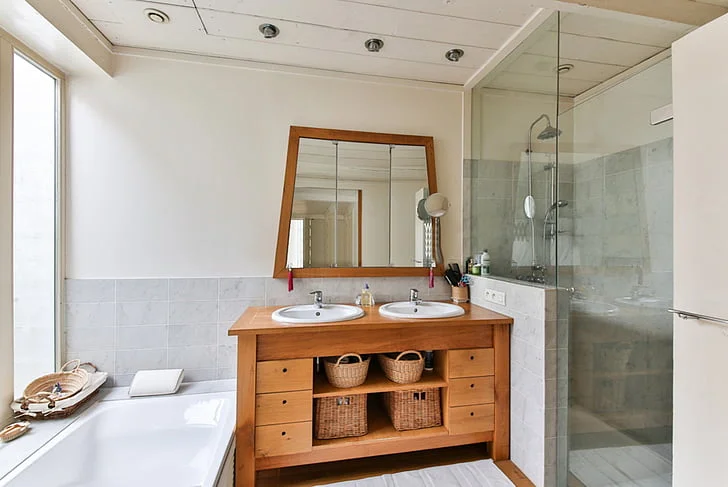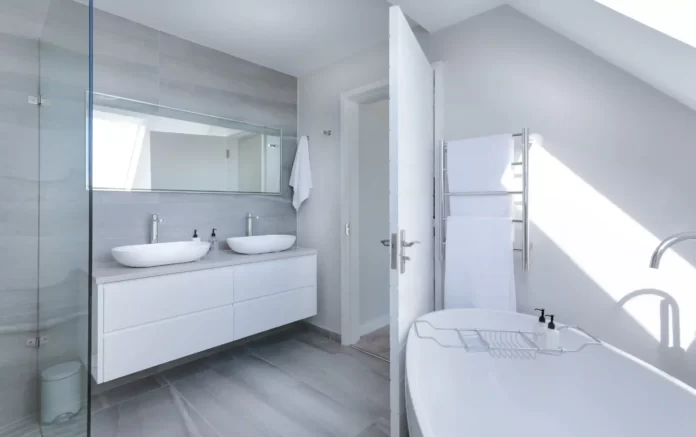Have you ever walked into your bathroom and been unpleasantly surprised by a sewer-like smell? It’s a common problem in many households, but the good news is that it’s usually one with a straightforward solution. This comprehensive guide will explore the various reasons behind these odours and provide you with practical, easy-to-follow advice to get your bathroom smelling fresh and clean once again.
5 Common Causes of Sewer Smell in Bathroom
1. Clogged Drains
One of the top reasons for that sewer smell is a blocked drain. This can happen in any home, no matter how clean you keep your bathroom. Hair, soap, and other debris can accumulate, leading to a blockage. This not only slows down water drainage but can also cause waste material to stagnate, leading to that nasty smell.
2. Dry P-Traps
These are the curved pipes under your bathroom fixtures. They’re designed to hold water, creating a seal that keeps sewer gases from entering your bathroom. If a fixture isn’t used for a while, the water in the P-trap can evaporate. This breaks the seal, allowing sewer gases to creep into your bathroom.
3. Damaged Toilet Seals
The seal between the toilet and the floor plays a vital role in preventing sewer gases from entering your bathroom. Over time, this seal can degrade or break, allowing gases to seep through.
4. Vent Pipe Issues
These pipes, which extend to the roof, help to regulate air pressure in your plumbing system. They also serve to remove gases and odours. A blockage or damage in these pipes can cause a backup of sewer gases into your bathroom.
5. Mold and Mildew
Sometimes, the bad smell in your bathroom might not be from the sewer, but from mold or mildew. These grow in wet places like bathrooms and can make a smell that’s a lot like a sewer smell.

How to Eliminate Sewer Smell in Bathroom with DIY Tips
1. Dealing with Blocked Drains
To tackle minor blockages, a plunger can often do the trick. For more stubborn clogs, a mixture of baking soda and vinegar, followed by boiling water, can work wonders.If these ways don’t work, you might have to use a tool called a plumber’s snake. This tool can reach deeper into the drain to remove the blockage. For those not comfortable with DIY, or if these methods fail, it’s advisable to call a professional plumber.
2. Maintaining P-Traps
Keeping P-traps from drying out is relatively simple. Make it a habit to run water through all your bathroom fixtures regularly. This is especially important for fixtures that are not frequently used, such as in a guest bathroom.
3. Fixing Toilet Seals
Inspecting and repairing the toilet seal might seem daunting, but it can be a manageable DIY project. Look for any signs of damage or leakage around the base of the toilet. If you find issues, replacing the wax seal might be necessary. While some might feel confident tackling this task, there’s absolutely no shame in enlisting the help of a professional.
4. Addressing Vent Pipe Problems
Vent pipe issues are often best left to professionals. These pipes can be high up and difficult to access safely. A plumber can clear any blockages and repair damage, ensuring these pipes perform their crucial role effectively.
5. Reduce Mold and Mildew
Regular cleaning is essential to prevent mold and mildew growth. Use a fan or open windows to improve ventilation, especially after showers or baths, as this helps reduce humidity levels. For existing mold, use a dedicated mold removal spray, following the instructions for safe and effective use.
Prevention Tips of Sewer Smell in Your Bathroom

Regular Cleaning and Maintenance
One of the simplest yet most effective ways to prevent sewer smells is to keep your bathroom clean and well-maintained. This includes regular cleaning of surfaces and fixtures, as well as paying attention to the less visible parts like inside drains.
Mindful Flushing and Disposal
Be conscious of what you flush down your toilet or wash down your sink. Avoid disposing of anything other than toilet paper in the toilet. Also, try to prevent hair and other debris from going down the shower or sink drains.
Using Fixtures Regularly
Regular use of all fixtures in your bathroom, including sinks, showers, and toilets, can help prevent P-traps from drying out and clogs from forming.
Ensuring Adequate Ventilation
Proper ventilation in your bathroom is crucial. It not only helps with preventing mould and mildew but also aids in evaporating any standing water in the P-traps, which is essential for maintaining the necessary water barrier against sewer gases.
Scheduling Professional Inspections
Having a professional plumber inspect your bathroom’s plumbing annually can be a wise decision. They have the expertise to spot potential issues early on and can provide maintenance tips specific to your home’s plumbing system.
When to Call a Professional
There are situations when DIY solutions just won’t cut it, and that’s when you need to call in a professional. Persistent bad odours, especially when accompanied by other symptoms like slow drains, water pooling around the toilet, or unusual gurgling sounds from your plumbing, are significant signs that professional intervention is needed. A qualified plumber can provide a thorough inspection and deal with more complex plumbing issues that could be causing the odour.

FAQs:
Why does my bathroom still smell after I clean it?
If you’re still noticing a bad smell after a thorough cleaning, it could indicate an underlying issue such as a dry P-trap, a damaged toilet seal, or a problem with the vent pipes.
Are the sewer smells in my bathroom harmful to my health?
In most cases, these smells are more of a nuisance than a health risk. However, prolonged exposure to certain sewer gases can be harmful, so it’s important to address the issue promptly.
How often should I be cleaning my bathroom to prevent these smells?
A general rule of thumb is to give your bathroom a good clean once a week. This should include cleaning the surfaces, fixtures, and occasionally the drains to prevent build-up that can lead to odours.
What are some signs that I should call a professional?
If simple fixes like cleaning the drains and checking the toilet seal don’t work, or if you notice slow drainage, water leakage around the toilet, or odd noises from your pipes, it’s time to call a professional.
Can certain bathroom cleaners contribute to the sewer smell?
Some chemical cleaners can interact with the materials in your pipes or disrupt the natural bacteria balance in your septic system, potentially contributing to unpleasant odours. It’s advisable to use natural cleaning solutions where possible and to follow the directions on any commercial cleaners carefully.
Is it normal for a newly renovated bathroom to have a sewer smell?
It’s not uncommon for new plumbing work to disturb existing pipes and systems, potentially leading to temporary odour issues. However, if the smell persists, it could be a sign of improper installation or other issues that might need professional attention.
How can I tell if the smell is coming from the shower drain or the toilet?
To pinpoint the source, you can try covering the shower drain and observing if the smell reduces. If it does, the shower drain might be the issue. Conversely, if covering the toilet seems to lessen the smell, the problem might be with the toilet.







